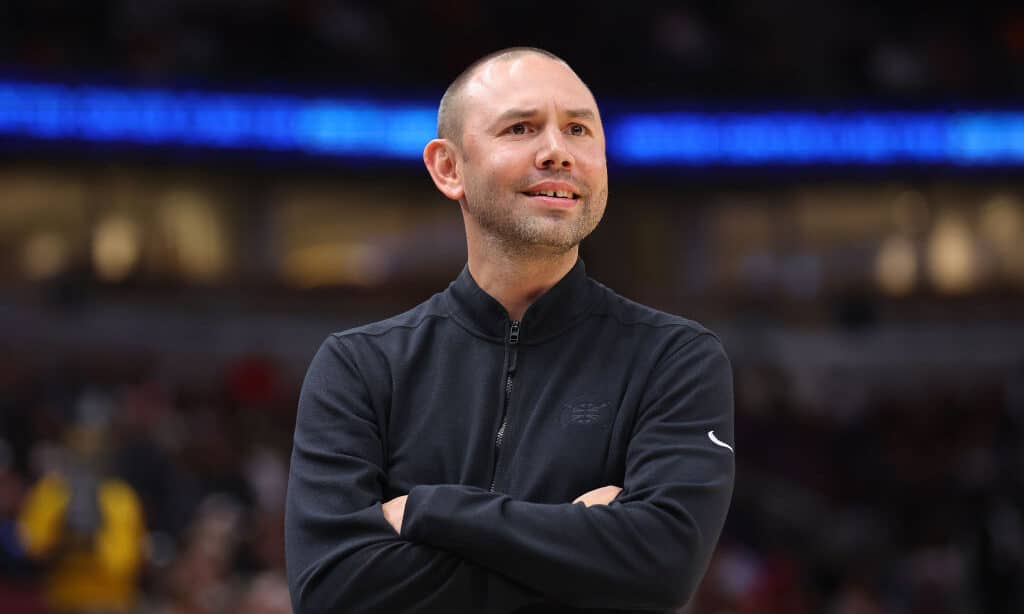“No team has ever come back from a 3-0 deficit in NBA history.”
If I had a nickel for every time I’ve heard, read or uttered this phrase in the past 48 hours, I’d probably have at least $2.35, which doesn’t sound like a lot of money, but it’s actually 47 nickels. I think we may need to modernize this idiom to account for inflation.
This statistical refrain—that no team has ever recovered from the deficit the Dallas Mavericks were in before the Boston Celtics handed them Game 4 for free—is being weaponized for all manner of rhetorical uses. It’s a tremendously effective coping mechanism, simply telling oneself that, of the 156 teams that have previously been in the Celtics’ position, not a single one has failed.
In the pantheon of coping devices, it levels up again when paired with the stat that, of teams that have led 3-0 in the NBA Finals, they are a pedestrian 9-6 in Game 4s. Oh, and the Celtics’ championship runs in 2008 and 1986 and 1984 all lost a closeout game on the road. So this is all fine, right?
Yeah, it’s probably fine. It makes sense mentally. The Celtics had bought themselves some room for error and dumped all the error imaginable on the court in Game 4. The home Game 5 should be a crisp and energetic closeout to the Celtics’ season. It would be more fun to win on their home court anyway, and it would even be on 6/17, the Boston-area dialing code and the anniversary of the team’s Game 6 clincher in 2008 over the Lakers. Good work, everybody. High-fives all around.
Photo by Joe Murphy/NBAE via Getty Images
Here’s the problem: most of the above argument actually doesn’t make any sense, and it’s not like the statistical breakdown of NBA history actually wins basketball games. So, whether you like it or not, I’m here to add a nickel to the pile and then punt the entire nickel-container to Nantucket.
First things first: Game 5 is not historically more advantageous for the Celtics than Game 4 was. Teams up 3-0 in Game 4 of the NBA Finals are 9-6 all time, but what about teams up 3-1 with a home closeout game, something that has happened 20 times in the Finals?
11-9.
Of course, when we combine our two statistics, only six of those 20 teams had been up 3-0, and all six obviously went on to win the series in five or six games. But the first commandant of statistics is that events exist independently of each other, so home closeout Game 5s are hardly the silver bullet that it feels like it should be, even if the team was up 3-0.
Secondly, the fact that the 2008, 1986 and 1984 lost road closeout games is completely irrelevant. Those games were played in completely different eras of basketball, with dramatically more important home court advantages and without the three-point variance monster every team must now confront. Also, if the Celtics win Game 5, I doubt anyone will mention that they are “joining a legendary pantheon of Celtics teams that all failed to close out the NBA Finals on the road before ultimately winning it.”
(I’d say the 6/17 argument is basically mystical religiosity too, but then I’d just be a buzzkill. I think we can all feel good about that one without offending the International Board of Statistical Reality.)
Eventually, a team is going to come back from a 3-0 deficit. To be fair, if I was ever going to bet on it happening, it would not be right now. It would have been last year, when the Miami Heat held one of the most bizarre and shocking 3-0 leads ever, and the Celtics’ on-paper talent advantage seemed like just the thing to finally make the impossible a reality. I’m definitely not still mad about that.
It’s extremely difficult to beat a team four times in a row. Human desperation, statistical regression and physical exhaustion all play a role in how few sweeps there are and why there’s never been a 3-0 comeback. But with how three-pointers affect the game, a team might just turn on a faucet and generate enough points to make it happen.
Finally, even if teams were 18-2 in home closeout Game 5s—which they aren’t—or even if NBA teams up 3-0 were 3,760,679-0 instead of just 156-0—which they obviously also aren’t—it wouldn’t matter. Because here’s the final crux of all of this: none of it matters!
As I said at the top, these stats are a coping mechanism, one with above-average statistical backing, but is by no means airtight. But history does not win basketball games, and it’s not going to win the Celtics the NBA Finals today.
Game 4 was distressing not just because they lost, but because they got annihilated in a way that makes you wonder if Dallas can do that three more times in a row. They probably can’t, but I would have felt a lot better if the Celtics had fought down to the wire and lost by four instead of by 38. That was a definitive mauling, and can’t be excused simply because “people have done it before and still won.”
I’m not saying don’t use stats and history to cope; by all means, please do. I have spent the last 48 hours inhaling more 3-0 statistic-based Copium* than is probably recommended by the FDA. But I do it with the cautious understanding that none of that means the Celtics will win. All it means is that teams in the past have survived what they just did.
But the ghosts of NBA history aren’t about to hand anyone a trophy. If the Celtics want this, they have to go out and take it.






